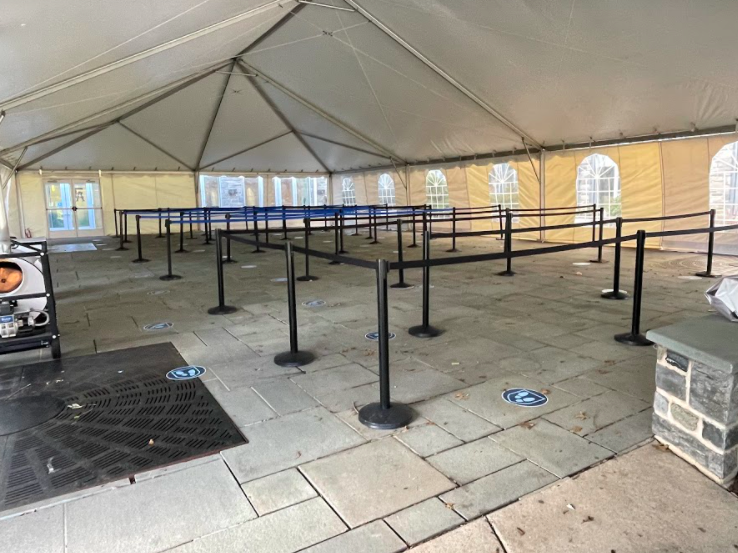Nayan Shankaran ‘24
Disciplinary consequences will be imposed for “risky behavior.” Form deans recently made it clear to students that they need to abide by the school’s safety protocols on its Health and Wellness Pledge. EA expects all students to wear masks, social distance, follow PA travel restrictions, self-quarantine, and test when necessary. All students were informed by their deans about the potential disciplinary consequences should they choose to violate these protocols, even outside of school.

Zachary Richards, Dean of the Class of 2021, held a recent meeting in the Chapel with the senior class to ensure that everyone understood the message. He says, “In essence, I told them if they want to engage in ‘risky behavior,’ go against state guidelines, and go against EA’s Health and Wellness Pledge, then they should opt for virtual instruction right now. If they choose to be on campus, we expect everyone to follow proper safety guidelines off campus.”
On December 3rd, 2020, just as EA prepared to resume in-person instruction after being virtual since Thanksgiving break, Dr. T.J. Locke, the Greville Haslam Head of School, announced in a letter to EA families that the Upper School would have to remain virtual due to the identification of “recent exposure risks […] that have impacted dozens of students in the division.”
“I’m sure students know what ‘risky behavior’ is,” says Michael Letts, the Head of Upper School. “What I have very little patience for,” Letts continues, “is if you as a family or a student feel that it is necessary to engage in high-risk behavior, such as a birthday party or a family get-together. This is your right as a family, but you have to follow our protocols if you want to be on our campus. There are two options: either go virtual, or make sure you contact Laura Hurst, our Director of Health Services, and follow her instructions on what you should do. That may mean that you have to quarantine or take a test. It’s not punitive in any way, it is a respectful response to the rest of this community whose safety is in all of our hands.”
Richards feels that the implementation of these COVID-19 policies is “somewhat difficult” because it requires administrators to monitor the off-campus behavior of students to some degree. Even though EA does not regularly track the behavior of its students outside of school, administrators and members of the faculty are able to learn about off-campus events through social media. “It never ceases to amaze me that [students] post things on social media that they think is private,” remarks Letts. “We’re not actively going through people’s social media accounts, but kids and parents show us things, [and] we hear kids in lounges. You have to remember, even when the normal world returns, that you are under a 24/7 policy here. Even before COVID, [we’ve] stumbled across things of a disciplinary nature that happened off-campus that we were not actively seeking out, but it inevitably comes to us because social media is not private.”
Despite “risky behavior” during COVID-19 being a severe violation of the school’s policies, Letts states, “We don’t have a separate discipline policy around COVID. […] The general disciplinary policy would apply to any behavior that we would articulate as being inappropriate for a variety of reasons. There is language in the discipline policy about being a safety hazard or threat to others within the community.”
When asked about possible consequences for COVID-19-related “risky behavior,” Jennifer Maier, an Upper School English teacher and Chair of the Disciplinary Committee, explains, “The severity of the offense is always a factor in the committee’s determination. As part of the process, the disciplinary committee reaches a consensus on the recommended punishment and then communicates it to Mr. Letts, but it is Mr. Letts’ decision whether to accept the recommendation of the committee.” According to Letts, however, EA has not yet taken disciplinary action regarding COVID-19-related issues.
Students share their perspectives and opinions on how EA is handling COVID-19 disciplinary action. Alec Riley ‘22 believes EA should “draft a set of guidelines that clarifies the exact definitions of ‘risky behavior,’ not because they are unclear, but because setting clear guidelines would allow them to better carry out their disciplinary policy.”
“EA has made their [COVID-19] policies very clear,” asserts Logan Schlitt ‘23. She explains that the students receive frequent reminders from their form deans to abide by these guidelines, so they know how to hinder COVID-19 viral transmission.
Although students are constantly informed about safety protocols, Schlitt notes, “I have seen many EA students on campus with their masks fully off or below their nose, especially when walking in the cafeteria and the hallways. Teachers will see them breaking the guidelines, but rarely reprimand the students for breaking guidelines, and at the most, they give them a gentle warning.”
Schlitt also comments, “EA should consider including a question in the Safety App about large gatherings without masks. There are students at EA who attend non-COVID safe gatherings over the weekend, putting the students who follow the guidelines at a higher risk. They also post publicly about these gatherings, making the majority of students aware that their fellow classmates are breaking the guidelines.”